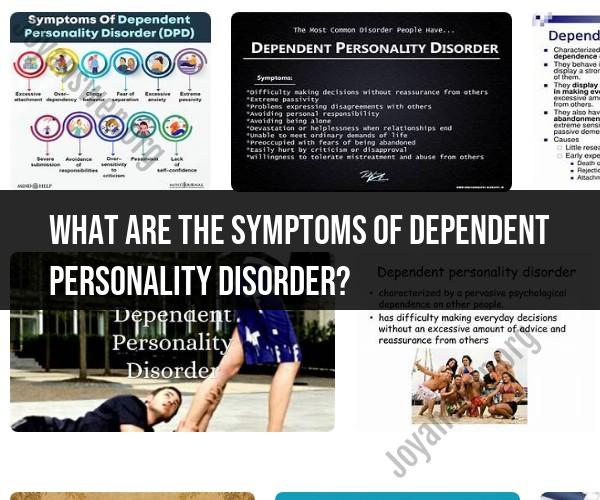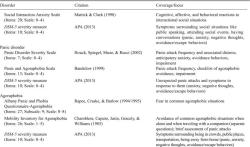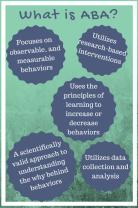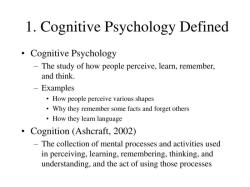What are the symptoms of dependent personality disorder?
Dependent Personality Disorder (DPD) is a mental health condition characterized by a pervasive and excessive need to be taken care of, which leads to submissive and clingy behavior. People with DPD often have a deep fear of abandonment and struggle to make decisions or take responsibility for their own lives. It's essential to note that only a qualified mental health professional can diagnose DPD, but here are some common symptoms and behaviors associated with this disorder:
Excessive Reliance on Others: Individuals with DPD rely heavily on others, typically one person, for their emotional and physical needs. They may have difficulty making everyday decisions without reassurance and guidance from this person.
Fear of Abandonment: A prominent feature of DPD is an intense fear of being left alone or abandoned. This fear often leads to desperation to maintain relationships, even if they are unhealthy or abusive.
Submissive and Passive Behavior: People with DPD tend to be passive and compliant, avoiding conflict and disagreement at all costs. They may go to great lengths to avoid upsetting others.
Difficulty Initiating Tasks: They have trouble initiating tasks or projects independently and often wait for someone else to take the lead.
Difficulty Expressing Disagreement: Expressing disagreement or asserting themselves is challenging for individuals with DPD. They may agree with others even when they have a different opinion.
Low Self-Confidence: DPD is often associated with low self-esteem and a lack of self-confidence. Individuals with this disorder doubt their abilities to make decisions or manage their lives.
Need for Reassurance: They frequently seek reassurance and approval from others, even for minor decisions. They may repeatedly ask for advice or guidance.
Difficulty Being Alone: Individuals with DPD often find it uncomfortable or distressing to be alone. They may go to great lengths to avoid being by themselves.
Tolerance of Mistreatment: They may tolerate mistreatment, abuse, or unhealthy relationships because of their fear of abandonment or rejection.
Difficulty with Independence: Achieving independence is challenging for people with DPD. They may rely on others for basic tasks and decision-making well into adulthood.
Avoidance of Responsibility: They often avoid responsibilities and obligations, as these can trigger anxiety and feelings of inadequacy.
Lack of Initiative: People with DPD lack initiative and often wait for others to make decisions or take action.
It's important to note that DPD is a complex condition, and individuals with this disorder may not exhibit all of these symptoms. Also, these symptoms can vary in severity from person to person. If you or someone you know is exhibiting symptoms of Dependent Personality Disorder, it's essential to seek help from a mental health professional. Effective treatment, such as psychotherapy (talk therapy) and, in some cases, medication, can help individuals with DPD develop healthier coping mechanisms and improve their quality of life.
Identifying Dependent Personality Disorder: Recognizing Key Symptoms
Dependent personality disorder (DPD) is a mental health condition in which a person has an excessive need to be taken care of, to the point where it interferes with their ability to function independently. People with DPD often have a deep-seated fear of abandonment and may go to great lengths to avoid being alone.
Here are some key symptoms of DPD:
- Difficulty making decisions without the advice and reassurance of others.
- A need to have others be responsible for most important aspects of their life.
- Difficulty expressing disagreement with others because they fear loss of support or approval.
- Difficulty starting projects or tasks because of a lack of self-confidence or ability to make decisions.
- A need to be liked and approved of by others.
- A fear of being abandoned or left alone.
- A willingness to go to great lengths to obtain support from others, even choosing to do unenjoyable things to get it.
The Traits of Dependency: Common Symptoms of Dependent Personality Disorder
People with DPD often exhibit a number of specific traits, including:
- Submissiveness: People with DPD often defer to others and avoid taking charge.
- Passivity: People with DPD may be hesitant to act on their own or take risks.
- Insecurity: People with DPD often have a low sense of self-worth and believe that they need others to survive.
- Need for approval: People with DPD often have a strong need to be liked and approved of by others.
- Fear of abandonment: People with DPD may have a deep-seated fear of being abandoned or left alone.
A Profile of Dependency: Understanding the Clinical Symptoms
DPD is a clinical diagnosis that is made by a mental health professional. To be diagnosed with DPD, a person must meet five of the nine criteria listed in the Diagnostic and Statistical Manual of Mental Disorders (DSM-5).
DPD is a relatively common mental health disorder, affecting about 1% of the population. It can occur in both men and women, but it is more common in women.
DPD can be a difficult condition to live with, but it is treatable with therapy. Therapy can help people with DPD to develop a stronger sense of self, learn to make decisions independently, and reduce their fear of abandonment.
If you think you or someone you know may have DPD, it is important to seek professional help. A mental health professional can assess your symptoms and recommend the best course of treatment.













